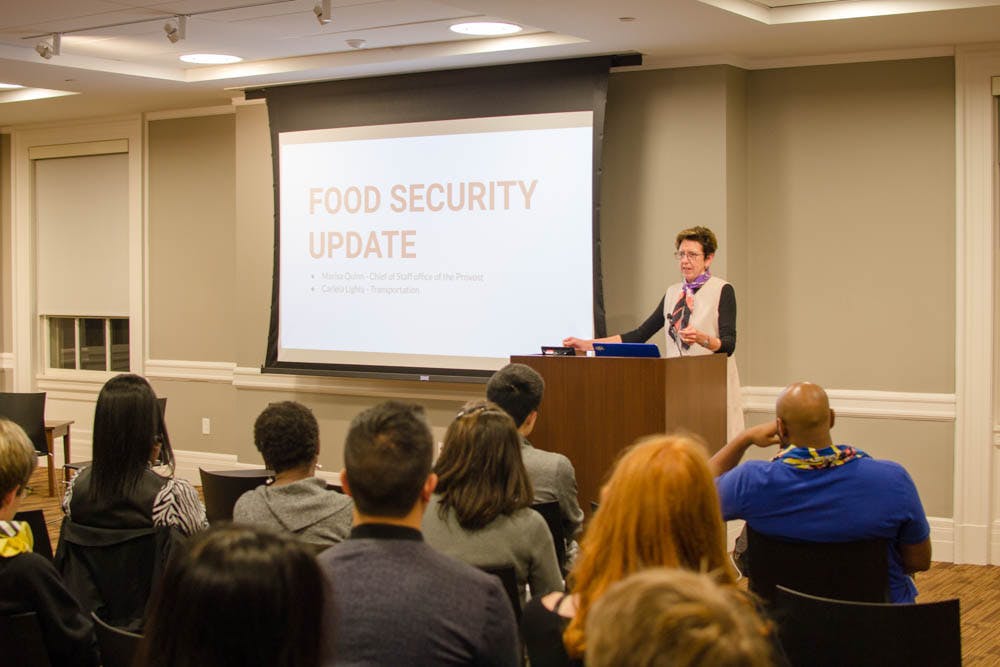Students expressed concerns to Brown Dining Services administrators about how the University has handled meal plan accommodation requests at the Undergraduate Council of Students’ general body meeting Wednesday evening.
The number of requests for meal plan accommodations increased after the University announced in May that sophomores would be required to enroll, said Assistant Director of Health and Wellness Jessie Curran at the meeting.
Accommodations can range from access to an allergy-friendly pantry to exemption from the meal plan entirely. “We have a lot of accommodations that we make available to people,” Curran said.
Curran also gave an overview of the meal plan accommodation process for arrangements that would violate University policy, such as meal plan exemptions for first-years or sophomores.
These types of requests are directed to a committee with representatives from Health Services, Dining Services, Student and Employee Accessibility Services, the Chaplain’s Office and Student Support Services, Curran said. The committee also includes a board-certified primary care physician, said Vanessa Britto, associate vice president for campus life and executive director for health and wellness. All members review requests along with any accompanying information or documentation to decide whether the student should remain on meal plan.
Students at the meeting raised concerns about transparency around the process and whether the offices involved have adequate expertise to decide on cases outside their typical purviews, with several wearing yellow to indicate their support for students they allege were not granted appropriate accommodations. Many students tied their questions to how the committee considers eating disorders.
“Because eating disorders are classified as a disability under the (Americans with Disabilities Act of 1990), why isn’t this process of getting an accommodation handled directly by SEAS, as that’s what it was created to do?” a student asked at the meeting.
“Dining knows our services best (and) knows what we can make available to somebody,” Curran said in response. Tracy Bergeron, a nutrition and eating disorder expert, was consulted on certain cases that the committee handled, Curran added. Bergeron did not sit on the committee because she does not work over the summer, which is when the committee primarily handled accommodations requests.
In addition, if students wanted to register their needs with SEAS, “they absolutely had that option,” Britto said. BDS and SEAS take on a “collaborative approach” to determine appropriate accommodations for students who approach SEAS instead of BDS, she added.
The accommodation process outlined by BDS on their website does not mention that students with eating disorders could have approached SEAS instead of BDS — a concern brought up by UCS Chair of Student Wellness Shivani Nishar ’20 at the meeting.
In response to criticism of the accommodation process, Curran defended how the University handles meal plan related requests.
“There is maybe a misunderstanding that not all individuals were getting accommodations,” Curran said. All students who made requests received “some level of accommodation or an opportunity to access resources. … At no point were people, at least from what we felt, left high and dry.”
Nishar said that student frustration stems from “students whose health (is) impacted, who are feeling as though their mental health and their wellness is in jeopardy and in danger because of the results of this accommodations process.”
UCS Chief of Staff Melissa Lee ’20 asked why the sophomore meal plan requirement had to be implemented over the summer.
“We all agree that the timing was not the best,” said Director of Dining Programs George Barboza. “I don’t think if ever there was a mandate again it would happen in the same way.”
Curran also presented on recent updates in dining services, including making the nutritional facts and ingredients of meals available online for all dining halls and working with student groups to improve the halal and kosher meal plan options.
Director of Dining Services Human Resources Sheila Coleman also discussed student employment, noting that BuDS is still hiring new student employees. Student coalition Save BuDS has recently raised concerns about the status of student employees, The Herald previously reported.
Also at the meeting, Chief of Staff to the Provost Marisa Quinn presented on the expanded on-call shuttle route, which now encompasses East Side Marketplace, Walmart and Savers, and a new student discount available for Peapod, a grocery delivery service.
At the start of the meeting, the Council elected Mukul Khanna ’23 as an Undergraduate Finance Board at-large representative.





